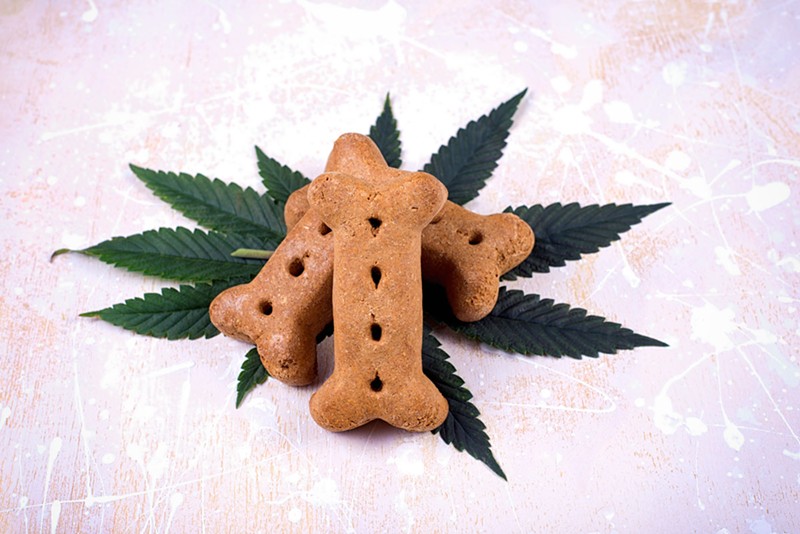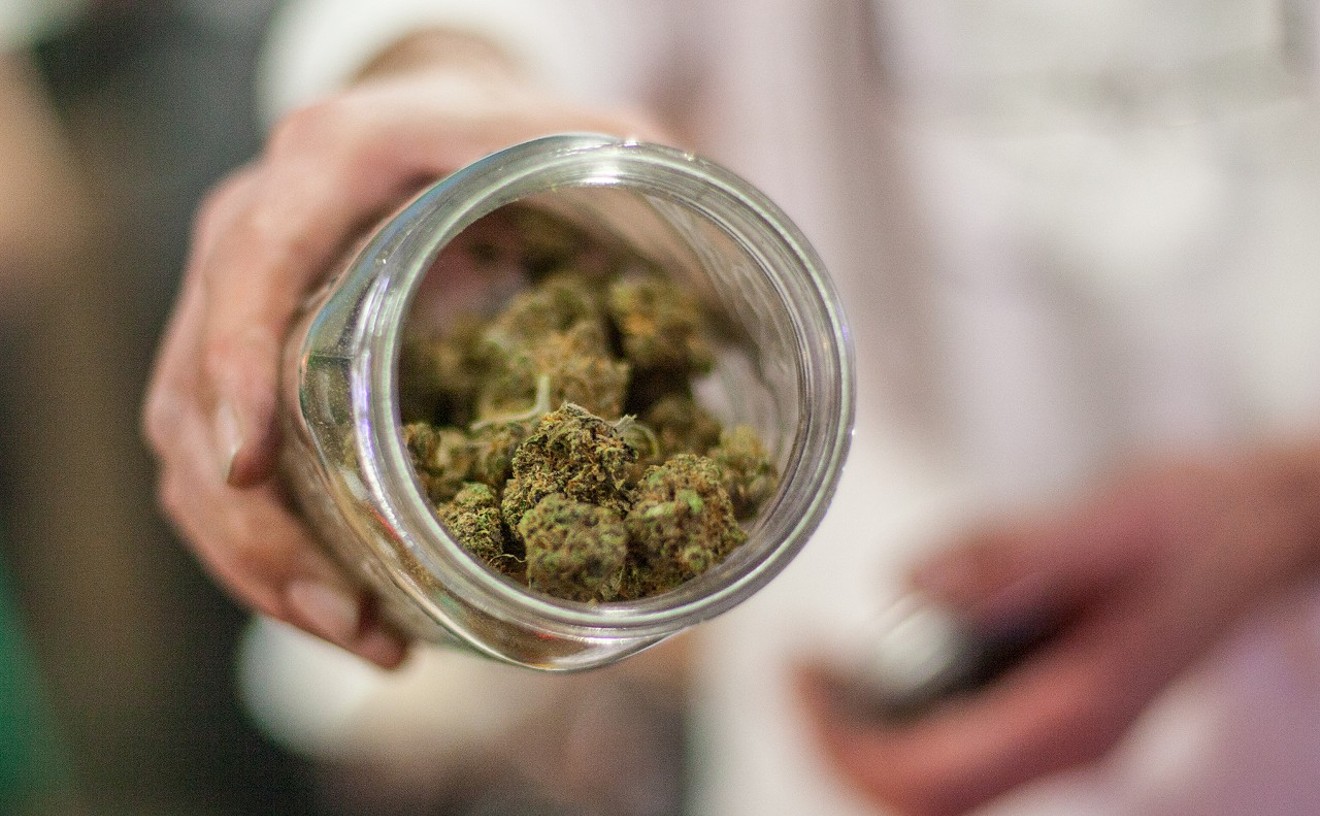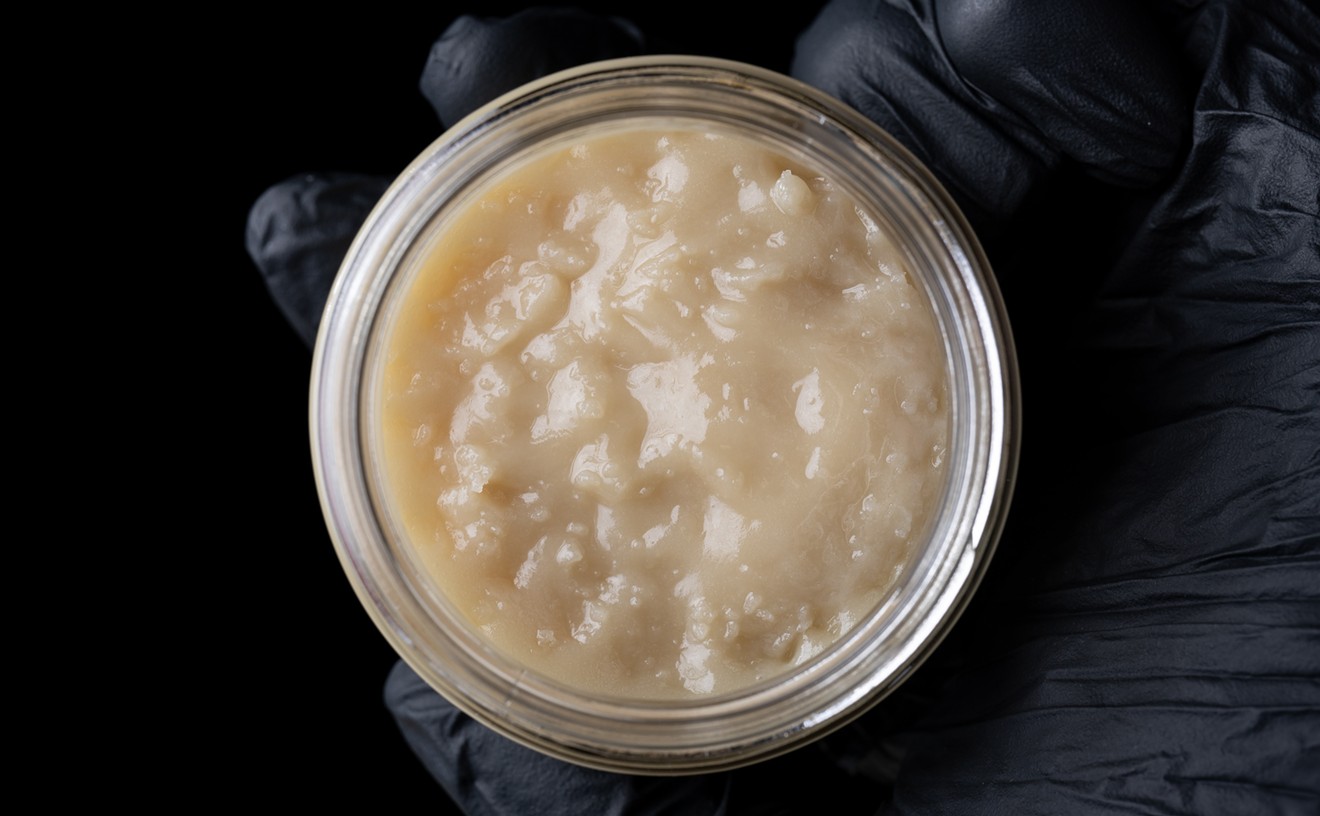Casara Andre is stuck between a rock and a hard place. In fact, so are all of her clients and some of her colleagues. The owner of Scheduled Relief veterinary clinic and a practicing veterinarian, Andre thinks cannabis products have medical benefits for pets, but she can't legally recommend cannabis for her furry patients, and there's little published research on the benefits of cannabis for animals to support her beliefs.
“Anecdotally, we have pet owners who say ‘I tried it, and it helps,’” Andre says. She's seen cannabis used in hospice pet care as an anti-inflammatory, and to help in reducing anxiety – but as with humans, there are no one-size-fits-all recommendations, she notes.
In any case, marijuana's federal status as a Schedule I substance prevents her from legally recommending the plant to pet owners. And because no peer-reviewed scientific research on the medical benefits of cannabis for companion animals has been published, all of her advice is phrased as "harm reduction," meaning pet owners must decide independently to use cannabis on their animals. She also must be clear that all of her guidance is anecdotally informed and is not offered as sound medical advice.
Interest and legitimacy for veterinary cannabis is beginning to flower, however, so Andre wants to bring pot-friendly pet parents and industry experts together to share in the scant knowledge that does exist. “Our clients ask us about this all the time, regardless of what camp they’re in,” she says. “Either they want to use it in their animals or they’re totally against it, but they’re always asking us, as veterinarians, what our opinion is.”
Mara Tingley, a Denver veterinary technician, uses a tincture with a 1:1 CBD to THC ratio on her seven-year-old cat, Sona. Tingley believes Sona lost several pounds because of inflammatory bowel disease; hesitant about using steroids to treat the condition long-term, which is the typical treatment for IBD, Tingley consulted Andre about using cannabis to help manage Sona’s symptoms.
“She’s gained most, if not all, of the weight back,” Tingley says. “She seems like herself again. I think together, the steroids and the cannabis sort of gives her the munchies all the time. But we kind of start with a low dose of the cannabis, and if they don’t have those kind of things that we associate with being stoned, then we can increase the dose.”
For now, Andre's recommendations to all of her clients are highly dependent on trial and error. How cannabis works – or doesn’t work – on animals is highly individualized, she says. Once she establishes what works for a specific animal, she moves into harm reduction, administration of best practices and what the pet's owner should look for in a cannabis product.
Whole-plant products are best, she says, but growing and extraction methods are very important. A fan of CO2 extraction, Andre prefers concentrates free of any potential solvents. If a contaminant is bad for humans, the effect can be magnified in a small animal, she explains.
Tinctures, or liquid marijuana extracts, are easiest to administer to animals in controlled amounts by the drop, making the serving sizes for 1:1 or 1:20 THC to CBD ratios clear. Should a pet have a bad reaction – or worse, should it get into THC-heavy product intended for humans – Andre recommends that a pet owner ensure the animal is hydrated and then accompany it to a quiet, dark room so the animal can sleep it off. Dogs, like people, can have elevated anxiety as a result of THC consumption, she believes.
“If we can make sure they have a quiet, dark room, the owner’s with them and it’s nice and calming – then we don’t see those anxiety symptoms come up,” she says of overconsumption, advising pet owners to work with a veterinarian before administering cannabis to help keep such a scenario from taking place.
“If the owner is just randomly giving the pet an amount of THC and they don’t know what’s right, you can run into some very bad situations where the animal is very uncomfortable,” Andre says. "My goal when I talk to pet owners and other clinicians is to address how we can guide the pet owner in the decisions they have already made for their pet."
Andre is organizing a symposium this fall intended to benefit pet owners and professionals who are interested in navigating the murky legal and medical waters of marijuana for companion animals. On October 7, pot-friendly pet owners and professionals will gather at the Butterfly Pavilion in Westminster to learn about harm reduction, emerging research and legal limitations in using medical cannabis for animals. There are also a variety of Facebook groups for owners to share their own experiences, such as CBD for Our Pets and CBD Oil for Pets.
[
{
"name": "Air - MediumRectangle - Inline Content - Mobile Display Size",
"component": "12017618",
"insertPoint": "2",
"requiredCountToDisplay": "2",
"watchElement": ".fdn-content-body",
"astAdList": [
{
"adType": "rectangle",
"displayTargets": "mobile"
}
]
},{
"name": "Editor Picks",
"component": "17242653",
"insertPoint": "4",
"requiredCountToDisplay": "1",
"watchElement": ".fdn-content-body",
"astAdList": [
{
"adType": "rectangle",
"displayTargets": "desktop|tablet"
},{
"adType": "rectangle",
"displayTargets": "desktop|tablet|mobile"
}
]
},{
"name": "Inline Links",
"component": "18838239",
"insertPoint": "8th",
"startingPoint": 8,
"requiredCountToDisplay": "7",
"maxInsertions": 25
},{
"name": "Air - MediumRectangle - Combo - Inline Content",
"component": "17261320",
"insertPoint": "8th",
"startingPoint": 8,
"requiredCountToDisplay": "7",
"maxInsertions": 25,
"watchElement": ".fdn-content-body",
"astAdList": [
{
"adType": "rectangle",
"displayTargets": "desktop|tablet"
},{
"adType": "rectangle",
"displayTargets": "desktop|tablet|mobile"
}
]
},{
"name": "Inline Links",
"component": "18838239",
"insertPoint": "8th",
"startingPoint": 12,
"requiredCountToDisplay": "11",
"maxInsertions": 25
},{
"name": "Air - Leaderboard Tower - Combo - Inline Content",
"component": "17261321",
"insertPoint": "8th",
"startingPoint": 12,
"requiredCountToDisplay": "11",
"maxInsertions": 25,
"watchElement": ".fdn-content-body",
"astAdList": [
{
"adType": "leaderboardInlineContent",
"displayTargets": "desktop|tablet"
},{
"adType": "tower",
"displayTargets": "mobile"
}
]
}
]











